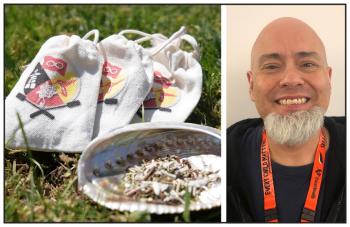Image Caption
Summary
Local Journalism Initiative Reporter
Windspeaker.com
It’s all about building relationships, says Elder Bill Bousquet. He’s the senior Indigenous cultural advisor with Indigenous health with the Fraser Health Authority in British Columbia.
He says a tangible indication of how building that trust starts is with the distribution of more than 500 medicine bags each year within the authority boundaries. And both Indigenous and non-Indigenous patients are included in that distribution, he says.
“I'll go into one of the psychiatric wards and I'll be working, specifically, with an Indigenous client,” said Bousquet, who focuses on mental health and substance use, “but you'll be surprised how many people just want to be a part of that. And I don't discriminate against that at all. If that's the medicine that they feel can help them then I'm all for it.”
Indigenous and mental health liaisons have a day of ceremony when they assemble the medicine bags. Each bag contains cedar to restore positive thoughts; sage to drive away negative energy and impurities and to bring strength; sweetgrass for good feelings and intentions; and tobacco for the purposes of prayer and giving thanks for being on this earth.
“We gather the medicines, and we do the right things to support the medicine being put in the bag. So it really starts right at the making of the bags and the emotions and feelings and spirits that go into it. The intentions. We have to make sure that all of those are good when we put that medicine in because that's where it starts,” said Bousquet, whose father is Métis with Anishinaabe ancestry and mother is Cree from Treaty 1 Territory in Manitoba.
Then the medicine bags are dispersed throughout the Fraser Health Authority “in a way that supports those good intentions,” he says.
The Fraser Health provides services within the traditional, ancestral and unceded territories of the Coast Salish and Nlaka’pamux Nations, and is home to six Métis Chartered Communities.
Working directly with clients, Bousquet does ceremony, traditional counselling and traditional wellness. Clients are seen in hospital and in the community.
“My first and foremost job…is building relationship. And it's about building that relationship in a way where it's … give and take, reciprocity, trust. All that kind of stuff comes first. And then through the relationship, I've built in ceremony and traditional wellness,” said Bousquet.
He points out that traditional medicine provides the spiritual perspective, something that is not offered through a western healthcare approach.
“Our medicine wheel starts in a spiritual aspect, and it goes around the circle from there. I think with the mainstream culture, and especially with health care, it's all about the physical and the mental aspects,” said Bousquet.
The authority operates 12 acute care hospitals stretching from Burnaby east to Hope. Not all of the hospitals have spaces that are ventilated to serve as traditional or ceremonial rooms. Sometimes, says Bousquet, in order to smudge he needs to move patients outdoors. But many of the hospitals are moving in the direction of including a traditional room.
He adds, though, that staff understanding the benefit of a traditional room and seeing it as a priority is a “mixed bag.”
“There's some people that are just so connected and wanting, and I'm not saying that most people don't want the best for people, but they see the value in that connection, that relationship, those ceremonies. And some people are just so damned busy that it's hard to see that,” he said.
Also, as senior Indigenous cultural advisor, Bousquet embeds cultural safety within Fraser Health’s programs and services. Along with the hospitals, the authority operates 81 long-term care homes, and offers public, home and community health care.
Bousquet has been in his position for almost two years and he believes the work that he and the 10 other Indigenous health liaisons do in offering up an Indigenous perspective in medicine is important when it comes to holistic healing.
“Having (clients) have a traditional ceremony that they've been involved with, that they’re comfortable with right there for them, it’s so important. It's that connection piece,” he said.
Local Journalism Initiative Reporters are supported by a financial contribution made by the Government of Canada.

